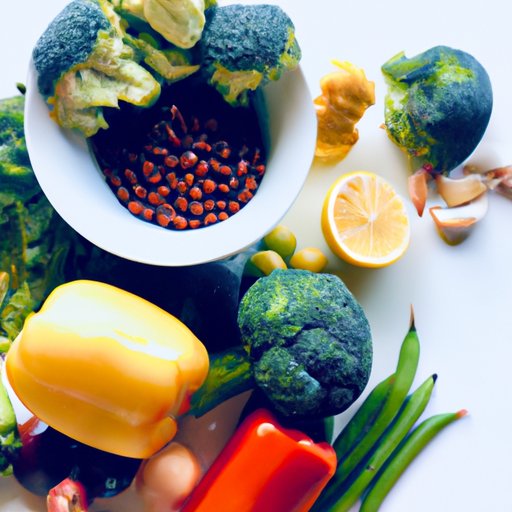Introduction
Protein is an essential macronutrient that plays an important role in many aspects of our health, including muscle growth, energy production, and immune system support. While animal products are the primary source of dietary protein, there are also many plant-based sources of protein, including vegetables. In fact, some vegetables contain surprisingly high amounts of protein. Read on to learn more about which vegetables have the most protein and how to get enough protein from vegetables.

A List of Vegetables with the Highest Protein Content
When it comes to getting protein from vegetables, there are many options to choose from. Here is a list of some of the highest-protein vegetables:
- Broccoli: 1 cup of cooked broccoli contains 4 grams of protein.
- Spinach: 1 cup of cooked spinach contains 5.3 grams of protein.
- Asparagus: 1 cup of cooked asparagus contains 3.2 grams of protein.
- Brussels sprouts: 1 cup of cooked brussels sprouts contains 4.1 grams of protein.
- Peas: 1 cup of cooked peas contains 8.6 grams of protein.
- Artichokes: 1 medium artichoke contains 4.2 grams of protein.
- Kale: 1 cup of cooked kale contains 2.9 grams of protein.
- Mushrooms: 1 cup of cooked mushrooms contains 3.4 grams of protein.
- Sweet potatoes: 1 medium sweet potato contains 2.2 grams of protein.
- Corn: 1 cup of cooked corn contains 4.7 grams of protein.
- Avocado: 1 avocado contains 4 grams of protein.

Exploring the Nutritional Benefits of Vegetables High in Protein
In addition to providing protein, vegetables high in protein are also packed with other essential nutrients. Here are some of the nutritional benefits of eating vegetables high in protein:
Vitamins
Many vegetables high in protein are rich in vitamins. For example, broccoli is an excellent source of vitamin C, while asparagus is a good source of vitamin A. Spinach is also an excellent source of both vitamins A and C.
Minerals
Certain vegetables high in protein are also rich in minerals. For instance, peas are a good source of iron, while mushrooms are a good source of zinc. Sweet potatoes are also a great source of potassium.
Fiber
Fiber is an important nutrient for gut health, and many vegetables high in protein are also high in fiber. For example, artichokes are an excellent source of fiber, as are Brussels sprouts and kale.
Antioxidants
Antioxidants are compounds that help protect our cells from damage caused by free radicals. Many vegetables high in protein are also high in antioxidants, such as broccoli, spinach, and mushrooms.
The Surprising Source of Protein: Vegetables
It may come as a surprise that some vegetables can be a significant source of protein. But when you consider the nutritional benefits of these vegetables, it is easy to see why they should be included in your diet.
How Much Protein Do You Need?
The amount of protein you need depends on your age, gender, and activity level. Generally speaking, adults should aim to consume 0.8 grams of protein per kilogram of body weight per day. This translates to about 56 grams of protein per day for the average adult.
Sources of Plant-Based Protein
In addition to vegetables, there are many other sources of plant-based protein, such as legumes, nuts, seeds, and grains. These foods can also be a good source of protein, so make sure to include them in your diet as well.
Eating More Vegetables to Increase Protein Intake
If you’re looking to increase your protein intake, adding more vegetables to your diet is a great way to do it. Not only are vegetables high in protein, but they also provide many other essential nutrients, such as vitamins, minerals, and fiber.
Top 10 High-Protein Vegetables
Here is a list of the top 10 highest-protein vegetables:
- Broccoli
- Spinach
- Asparagus
- Brussels sprouts
- Peas
- Artichokes
- Kale
- Mushrooms
- Sweet potatoes
- Corn

Eating Your Way to Protein with Vegetables
Now that you know which vegetables are high in protein, you can start incorporating them into your diet. Here are some recipes and meal ideas to help you get started:
Recipes
- Veggie stir-fry
- Vegetable soup
- Veggie burgers
- Roasted vegetables
- Veggie omelet
Meal Ideas
- Grilled vegetables and quinoa
- Stuffed peppers with lentils
- Vegetable curry with brown rice
- Baked sweet potatoes with black beans
- Vegetable lasagna
Getting Enough Protein from Vegetables: What You Need to Know
Getting enough protein from vegetables is possible, but it requires planning and mindful eating. Here are some tips for increasing your protein intake from vegetables:
Protein Deficiency
If you’re not getting enough protein from your diet, you may be at risk of protein deficiency. Symptoms of protein deficiency can include fatigue, weakness, and weight loss. If you think you may be deficient in protein, talk to your doctor about ways to increase your intake.
How to Get Enough Protein from Vegetables
To get enough protein from vegetables, make sure to include a variety of high-protein vegetables in your diet. Aim to eat at least one serving of a high-protein vegetable at each meal. You can also add protein-rich ingredients, like nuts and seeds, to meals and snacks to boost your protein intake.
Tips for Increasing Protein Intake
- Include a variety of proteins in your diet, including plant-based proteins.
- Eat small, frequent meals throughout the day to ensure you’re getting enough protein.
- Opt for high-protein snacks, such as nuts, nut butter, or yogurt.
- Make sure to include plenty of vegetables in your diet to get enough protein.
Conclusion
As you can see, vegetables can be a great source of protein. Eating a variety of high-protein vegetables can help you meet your daily protein needs and provide your body with essential nutrients. With the right recipes and meal ideas, you can easily get enough protein from vegetables.


